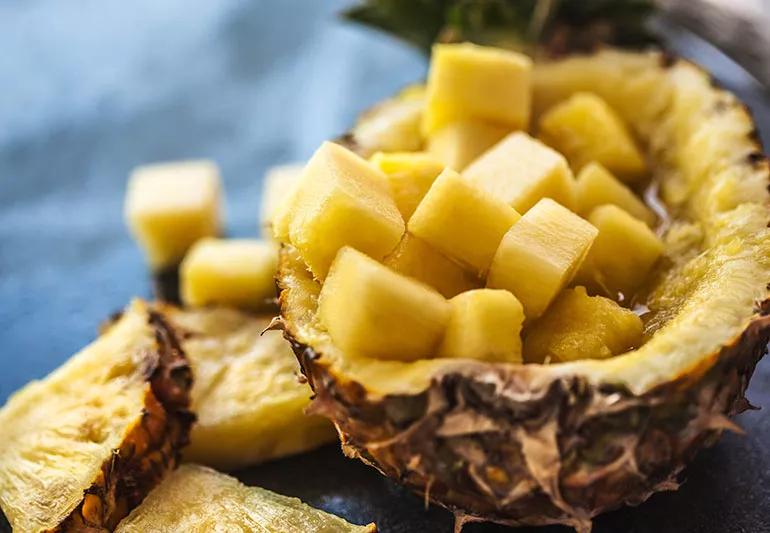Here’s how pineapple boosts your health

Don’t let that spiny skin intimidate you. Pineapple is sweet enough to rival most candies — and it packs way more health benefits. Registered dietitian Julia Zumpano, RD, LD, talks about how this tasty tropical fruit boosts your health.
Advertisement
Cleveland Clinic is a non-profit academic medical center. Advertising on our site helps support our mission. We do not endorse non-Cleveland Clinic products or services. Policy
Pineapple is low in calories and high in vitamins and minerals. One cup of pineapple chunks will deliver:
“Pineapple is the only food known to contain bromelain, an enzyme that helps your skin and tissues heal,” Zumpano shares. “Bromelain appears to produce substances that combat in pain and swelling.”
Advertisement
Consuming bromelain from pineapple might also help your skin heal after surgery or injury.
“Inflammation is a natural process that occurs in our bodies to help fight off illness,” Zumpano explains, “but too much inflammation, especially over long periods, can lead to conditions like rheumatoid arthritis and cancer.” The anti-inflammatory power in bromelain can help fight inflammation and may suppress the growth of certain tumors.
Of course, eating pineapple isn’t a cancer-free guarantee. “But eating lots of colorful fruits and vegetables, including pineapple, is a good way to help prevent cancer and other health conditions,” Zumpano says.
Here’s another reason to make pineapple your go-to dessert: Pineapple contains a significant amount of fiber, which is associated with better digestion. Bromelain is also thought to aid in digestion, though there’s not enough scientific evidence to say for certain.
The anti-inflammatory power of pineapple’s bromelain may provide pain relief for people with osteoarthritis. “If you have achy joints from osteoarthritis, try adding pineapple into your diet,” Zumpano suggests, “but don’t stop taking your medications or change your dose without talking to your doctor.”
Most weight loss experts recommend a diet rich in fruits and vegetables if you’re trying to shed pounds. But pineapple could be your diet’s BFF (best fruit friend) because its enzymes just might help with fat burning.
“The studies on pineapple as a weight-loss aid are only animal-based, so we need more evidence of this claim,” Zumpano notes. “But adding some of this healthy fruit to your diet certainly couldn’t hurt.”
When your muscles work hard, they produce inflammation — leading to that inevitable soreness that can sideline you for up to three days. But popping pineapple into your post-workout smoothie might help you get back to your training regimen a little sooner. “The anti-inflammatory power in pineapple could soothe muscles and may help them recover more quickly,” Zumpano says.
Pineapple is a standalone snack once it’s cut into ring-shaped slices or chunks. But if you want to avoid cutting it, many grocery stores offer pre-cut pineapple. Frozen and canned pineapple are good options, too.
“Choose canned pineapple packed in its juice, not syrup,” Zumpano advises. “Pineapple is sweet enough on its own, so skip the added sugar when you can.”
Pineapple doesn’t have to go it alone either. This fruit also fits well into a variety of sweet and savory meals. These recipes provide some inspiration:
Advertisement
Pineapple’s impressive nutrition profile makes it a healthy dessert, side dish or anytime nosh. A one-cup serving (165 grams) offers just 75 calories without any cholesterol, sodium or fat.
While some of pineapple’s health claims need further study, there’s no denying it’s loaded with nutrients that can boost your well-being. Slice, chunk, grill or blend it — however you choose to eat it, enjoy adding this bright, tangy fruit to your diet.
Advertisement
Learn more about our editorial process.
Advertisement

The tropical fruit is a good source of antioxidants and vitamin C

High amounts of cholesterol and saturated fat in red meat may be linked to heart disease

The leaves and pods from this tree are rich in essential nutrients

This starchy root vegetable is a staple in many global cuisines — but it has to be prepared correctly, or it can cause serious concerns

These delicate green sprouts can give you an extra dose of vitamin K and other nutrients — but they’re not safe for everyone

Edamame, lentils and chicken breast are good sources of protein

Eating this root vegetable can help support your eye, heart and brain health

The flavorful herb is full of antioxidants that may help regulate blood sugar

Wearing a scarf, adjusting your outdoor activities and following your asthma treatment plan can help limit breathing problems

Your diet in the weeks, days and hours ahead of your race can power you to the finish line

When someone guilt trips you, they’re using emotionally manipulative behavior to try to get you to act a certain way